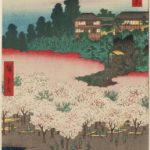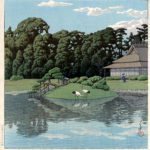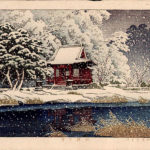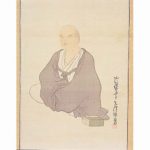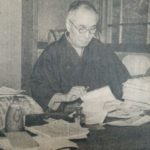Matsuo Basho's Autumn haiku poems
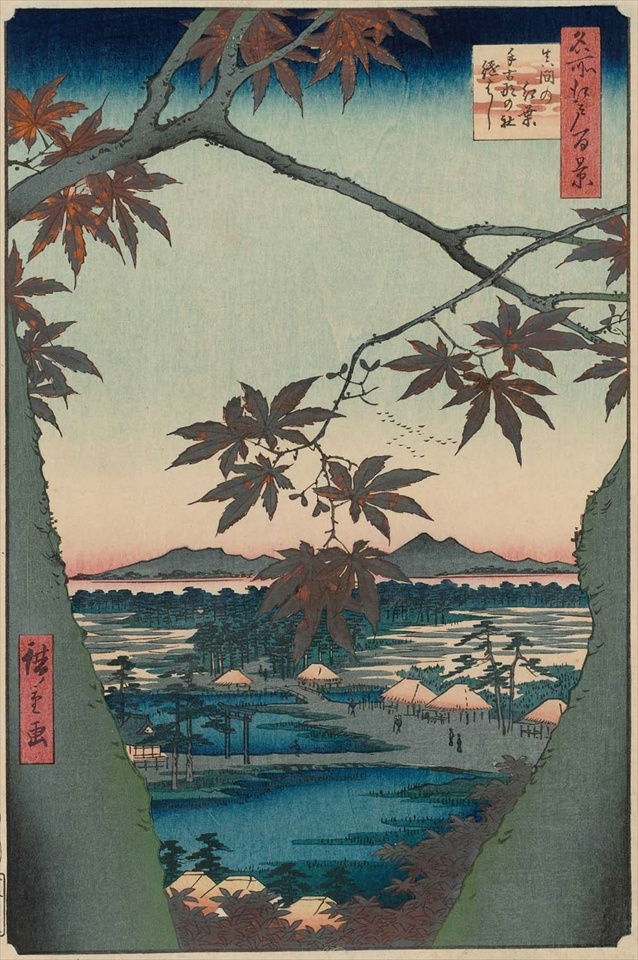
The autumn haiku poems of Matsuo Basho (1644-1694) have not only seasonally lonely but also somewhat frank. And some of them represent his later years.
Related Posts
<Japanese>
秋の夜を 打ち崩したる 咄かな
Aki no yo wo/ Uchikuzushitaru/ Hanashi kana
<English>
In the autumn night,
Breaking into
A pleasant chat.
<Japanese>
詠むるや 江戸には稀な 山の月
Nagamuru ya/ Edo niha marena/ Yama no tsuki
<English>
I stare at,
Rarely seen in Edo,
The moon in the mountain.
<Japanese>
鷹の目も 今や暮れぬと 鳴く鶉
Taka no me mo/ Imaya kurenu to/ Naku uzura
<English>
The eyes of hawks
Would be in the dark,
The quai crys.
<Japanese>
白髪抜く 枕の下や きりぎりす
Shiraga nuku/ Makura no shita ya/ Kirigirisu
<English>
I pull out the gray hairs,
And under my pillow,
There is a cricket.
*kirigirisu: In ancient Japanese “kirigirisu” meant today’s cricket. Kirigirisu means katydid now.
<Japanese>
朝茶飲む 僧静かなり 菊の花
Asacha nomu/ So shizuka nari/ Kiku no hana
<English>
Drinking the morning green tea,
The monk is calm.
The flowers of chrysanthemum.
<Japanese>
俤や 姥ひとり泣く 月の友
Hakanage ya/ Oba hitori naku/ Tsuki no tomo
<English>
Really fragile
The old mother cries alone.
The friend of the moon.
*One of the Japanese old story, one man cast behind his mother in the mountains because he was told by his wife. But the beautifulness of the moon awake him and he took her from the mountains to the home.
<Japanese>
ぴいと啼く 尻声悲し 夜の鹿
Pii to naku/ Shirigoe kanashi/ Yoru no Shika
<English>
The cry of “Pii”.
The last of the voice is so sad.
The night deer.
<Japanese>
むざんやな 甲の下の きりぎりす
Muzan yana/ Kabuto no shita no/ Kirigirisu
<English>
It’s sorry,
Under the war helmet
The cricket.
*the war helmet: Basho imagined the samurai Saito Sanemori who dead as one of the Taira family in Heian Period.
<Japanese>
武蔵野や さはるものなき 君が傘
Musashino ya/ Sawarumono naki/ Kimiga kasa
<English>
The Musashino region,
There is no obstacle.
Your travel woven hat.
<Japanese>
おもしろき 秋の朝寝や 亭主ぶり
Omoshiroki/ Aki no asane ya/ Teishu-buri
<English>
It’s great.
Having an autumn lie-in.
As the host.
<Japanese>
この秋は 何で年寄る 雲に鳥
Kono aki ha/ Nande toshiyoru/ Kumo ni tori
<English>
In this autumn,
Why I get older?
The clouds and birds.
<Japanese>
色付くや 豆腐に落ちて 薄紅葉
Irozuku ya/ Tofu ni ochite/ Usu-momizi
<English>
Changed the red color,
Fallen on the tofu,
The leaf of the light crimson maple.
<Japanese>
川上と この川下や 月の友
Kawakami to/ Kono kawashita ya/ Tsuki no tomo
<English>
The upper reaches here
And the lower of the river.
The friend for the moon.
<Japanese>
しにもせぬ 旅寝の果よ 秋の暮
Shini mo senu/ Tabine no hate yo/ Aki no kure
<English>
I’m not likely to die.
The result for the days of sleeping away from home.
It’s the end of the autumn.
*This haiku poem was created when Matsuo Basho took the jouney of “Journal of Bleached Bones in a Field”(Nozarashi-kiko) at the age of 41. The trip was started five years before “The Narrow Road to the Deep North”.
<Japanese>
月代や 膝に手を置く 宵の宿
Tsukishiro ya/ Hiza ni te wo oku/ Yoi no yado
<English>
The white sky with the rising moon .
We put our hands on the knees.
The house at the evening.
<Japanese>
早く咲け 九日も近し 菊の花
Hayaku sake/ Kunichi mo chikashi/ Kiku no hana
<English>
Bloom quickly.
The ninth day is very soon.
The chrysanthemum.
*September 9th is called the Choyo Festival(Chrysanthemum Festival) and it is a day to pray for long life to the flower that would let people.
More Basho’s haiku poems
Other famous Japanese poets


